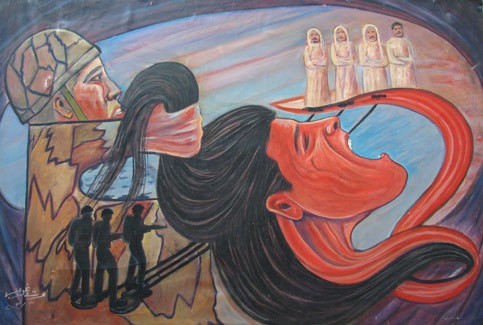by George Stein
*Leila (name has been changed for job security)
Leila was born in Al- Jiflik in 1962. Her family were refugees from 1948, originally from Al nfaat village, near Al khdarah which is located in the north of Palestine, around Haifa. Leila tells us, “I have never been to my family village, but I heard that it is very good agricultural land.” The land was used to plant watermelon and vegetables. In Al nfaat village, Leila’s family had a good house and jobs.
Until 1967, Leila’s family lived in the refugee camp in Abu Ajaj. After this time, the Israeli Occupational forces forced her family out of this camp, which was destroyed, to relocate them to a village near the Jiftlik gas station on the main road stretching from Amman to Nablus.
She tells us that she and her nine siblings (two sisters and seven brothers), along with her father and mother all lived together in Jiftlik. Then it became too difficult to earn a living and her father and mother passed away. Shortly after, all of her sisters and brothers left the area because of a shortage of their basic needs, such as water and housing. “The Israeli authorities do not allow us to build or renovate houses,” she tells us, “Everybody except me and one of my brothers left.” Some of Leila’s siblings are now in Jordan and some are in Tulkarem where they can find water and agricultural land.
Leila is still in Jiftlik with her son. She got married in 2000 to her husband, who is a Palestinian refugee, living in Jordan. He spent four months with her in Jiftlik, but was forced to return to Jordan and is restricted from entering the country. Leila and her son have visited him a few times, but it is too expensive for them to travel back and forth, and so they cannot maintain frequent contact with her husband. Her husband cannot find work in Jordan, so in order to support herself and her son, Leila has no choice but to work on the settlement .
“I wake up at 4 am and wake up my son and I wash his face to make him wake up and go to school. He is now 12 years old. Its very difficult. My son has a very difficult life. When he was two years old I had to go to work at 5am. So I would leave food and water for him. I have no choice. And when I come back I find him sleeping on the floor.” She explains that some days there wasn’t even enough bread to eat. Leila would not eat for days, but would still feed her son milk from her chest. She praises god, saying she does not know how she overcame such difficulties when her son was a baby. She is grateful that her son is older now, that he can recognize things around him, that he is wise. She explains, “I make food and tea for him and wake him up before I leave. I call him on the phone. But when he was small it was difficult for a mother to leave her son alone.” At this time, Leila’s house did not have walls, windows, a door or kitchen. She explains that it was more like an animal barracks, with only a fence around it. It had a metal roof, which heats up in the desert sun, making it very difficult to live in. She would leave her son there and was afraid all day, for him, that a snake or a scorpion would come into the house.
“Why do you want to write about my life?” Leila asks sadly, “it is very hard for me to remember this. When I remember these difficulties I feel like I have a huge pain inside me. My head hurts. I am very sad for the days I left my son alone. How I used to leave him while he is two years old in the house. I struggle to stay in life. I did not become weak. I am not weak. I struggle for myself and my son. Nobody helps me. I struggle alone. As for this, when I remember these days I feel very sad. I love my son so much. I feel sad for my son. When I’m working in the settlement I heard him crying and I start crying. I heard his voice in my ears; I heard him crying. This is life. And we manage to stay in this life. “
Leila explains that now she has become very tired and sick. She has worked for most of the last twenty years of her life. “When I wake up in the morning, I am so tired I can hardly see.” But she has no choice. She must continue to work in the settlement.
“I passed very difficult days,” she tells us, “If I’m tired or sick, if it’s cold or hot… I have to go every day. I have to wake up at four am and have to work at five. Even if I’m sick, if I’m very sick… I have to go.”
She says that one day she hopes to see the village where her family lived before 1948. “Why not? Everyone loves where they were born, their own country. We need to see it. I have a big hope in life. Without this hope I will not be able to continue. I hope my son will continue his education, I don’t want him to continue his difficult life. I want him to forget the difficulties. I hope before I die, I will see him happy and in a good life and I hope that my experience in life- nobody will face such a life. But I am still strong and I will continue. “

